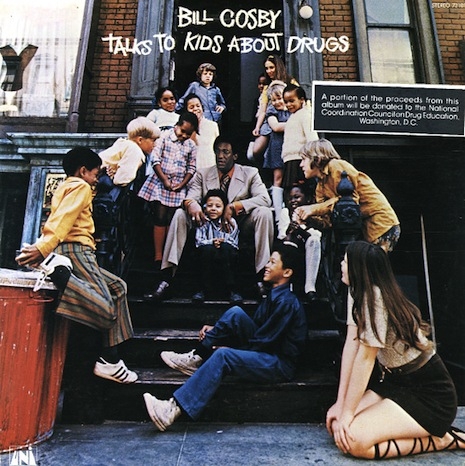
For a generation now, Cosby has played an uneasy role in the African-American community as the most unforgiving variety of scold, getting on Eddie Murphy for his foul language as well as countless other examples of same—the standup routine of Hannibal Buress that started the whole “Bill Cosby is a rapist” news story explicitly referenced this side of Cosby’s persona. (As it happens, I’ve seen Buress perform many times in person and I dig his style of standup. I also admire his bravery in bringing the, er, highly litigatable subject up.) Cosby’s forays into music, including the remarkable 1968 album Bill Cosby Sings Hooray for the Salvation Army Band! (which we covered here), show a restlessness and ambition and willingness to try anything that is fairly admirable while also, perhaps, conforming more to the picture of Cosby that has emerged in the last few weeks, that of someone who takes what he wants—this might be a stretch, but the point is that Cosby didn’t necessarily listen to those around him who might have dissented with his plans. Of course, 400 million dollars later, he might have had a point. Then there’s this interesting report from seasoned sitcom writer and showrunner Ken Levine (M*A*S*H, Frasier, etc.), which asserts that working on The Cosby Show was a terrible gig because Cosby treated his writers like shit. (To be fair, a writer who worked on the show in the show’s final year opines in comments that it wasn’t all that bad—at least in Season 8.)
Chalk up to Cosby’s history of questionable decisions the putative subject of this post, his exceedingly strange 1971 album Bill Cosby Talks to Kids About Drugs, which—indeed—consists mostly of Bill Cosby talking to kids about drugs and singing some half-baked (sorry) songs. I own this album on LP, and it is a really weird album. Believe it or not, after winning a ridiculous six consecutive Grammies for “Best Comedy Performance,” this album won a Grammy as well, but for “Best Album for Children.”
Here’s the introductory track, which eventually resolves into an aural representation of how downers and uppers feel (hint: the speed is adjusted):
Bend an ear to “Dope Pusher,” which ends with the immortal lines “Goodbye, dope pusher! Goodbye with your bag of death and agony and pain! You’ll have to find somebody not as smart!”
Here’s the similarly demented “People Makes Mistakes,” which sounds for all the world like an improv’d first take—the whole album sounds like that, really—even if it does boast a bitchin’ jazz trumpet bed:
You can see Cosby’s good intentions all over the album, but the question remains: WHY DO THIS??? I can understand the importance of inculcating an anti-drug ethic in children, but the entertainment/educational value of treating children as peers on the subject of hallucinogens….. I don’t get it. If nothing else, it makes for an especially odd album and one that’s ripe for remixing, as Cassetteboy apparently did on their 2005 album Dead Horse, as you can see below on the track “Anne Frankingmachine”:
Here’s Cosby in an anti-drugs PSA from a year earlier, which, as far as I can tell, has nothing whatsoever to do with the album:
Thanks to Kliph Nesteroff for the idea and to Ron Kretsch for the Cassetteboy assist.